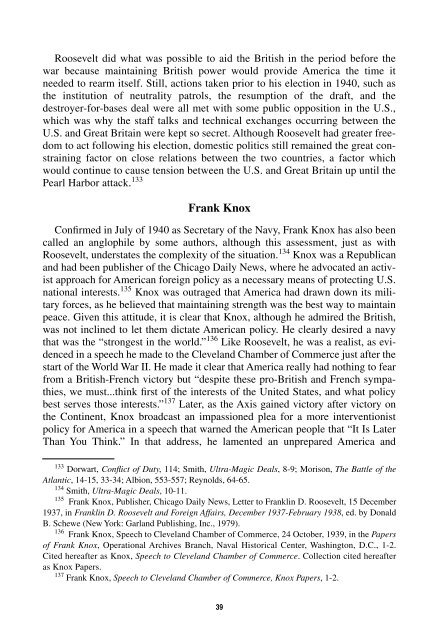Roosevelt did what was possible to aid the British in the period before thewar because maintaining British power would provide America the time itneeded to rearm itself. Still, actions taken prior to his election in 1940, such asthe institution of neutrality patrols, the resumption of the draft, and thedestroyer-for-bases deal were all met with some public opposition in the U.S.,which was why the staff talks and technical exchanges occurring between theU.S. and Great Britain were kept so secret. Although Roosevelt had greater freedomto act following his election, domestic politics still remained the great constrainingfactor on close relations between the two countries, a factor whichwould continue to cause tension between the U.S. and Great Britain up until thePearl Harbor attack. 133Frank KnoxConfirmed in July of 1940 as Secretary of the Navy, Frank Knox has also beencalled an anglophile by some authors, although this assessment, just as withRoosevelt, understates the complexity of the situation. 134 Knox was a Republicanand had been publisher of the Chicago Daily News, where he advocated an activistapproach for American foreign policy as a necessary means of protecting U.S.national interests. 135 Knox was outraged that America had drawn down its militaryforces, as he believed that maintaining strength was the best way to maintainpeace. Given this attitude, it is clear that Knox, although he admired the British,was not inclined to let them dictate American policy. He clearly desired a navythat was the “strongest in the world.” 136 Like Roosevelt, he was a realist, as evidencedin a speech he made to the Cleveland Chamber of Commerce just after thestart of the World War II. He made it clear that America really had nothing to fearfrom a British-French victory but “despite these pro-British and French sympathies,we must...think first of the interests of the United States, and what policybest serves those interests.” 137 Later, as the Axis gained victory after victory onthe Continent, Knox broadcast an impassioned plea for a more interventionistpolicy for America in a speech that warned the American people that “It Is LaterThan You Think.” In that address, he lamented an unprepared America and133 Dorwart, Conflict of Duty, 114; Smith, Ultra-Magic Deals, 8-9; Morison, The Battle of theAtlantic, 14-15, 33-34; Albion, 553-557; Reynolds, 64-65.134 Smith, Ultra-Magic Deals, 10-11.135 Frank Knox, Publisher, Chicago Daily News, Letter to Franklin D. Roosevelt, 15 December1937, in Franklin D. Roosevelt and Foreign Affairs, December 1937-February 1938, ed. by DonaldB. Schewe (New York: Garland Publishing, Inc., 1979).136 Frank Knox, Speech to Cleveland Chamber of Commerce, 24 October, 1939, in the Papersof Frank Knox, Operational Archives Branch, Naval Historical Center, Washington, D.C., 1-2.Cited hereafter as Knox, Speech to Cleveland Chamber of Commerce. Collection cited hereafteras Knox Papers.137 Frank Knox, Speech to Cleveland Chamber of Commerce, Knox Papers, 1-2.39
praised the fighting spirit of the British, not because he was an anglophile, but forthe most concrete of strategic reasons—“If she [England] falls, and her vast seapower is broken or seized...the Atlantic Ocean will cease to be our great barrier ofdefense.” 138 For Knox, it was in America’s self-interest to aid Great Britain and,while he may have felt an affinity for that country, it was his sound strategic sensewhich told him that America could not avoid war.Admiral Harold R. StarkADM Stark relieved ADM Leahy as CNO on 1 August 1939. Stark was waryof the British most likely because, as ADM Sims’ Flag Secretary, he had seenfirst-hand during World War I how the British treated their “junior partners,” theAmericans. Even though Stark had learned how to work with the British effectively,he, like many of his counterparts, was determined that the U.S. would onlywork with the British as equals in the future. 139 Despite a history of working successfullywith the British, Stark’s personal views show that he was unimpressedwith them. In a personal letter to the commander of the U.S. Asiatic Squadron,Admiral T. C. Hart, Stark wrote that his Special Naval Observer (SPECNO) inLondon, RADM Ghormley, had just told him the British were expecting the U.S.to enter the war soon after Roosevelt’s reelection in 1940. Stark told Hart thisexpectation on the part of the British was “merely another evidence of their slackways of thought, and their non-realistic views of international political conditions,and of our own political system.” 140Clearly, Stark was no fan of the British, yet, as the author of the famous “PlanDog” memorandum in November 1940, he was responsible for “reversing thePacific orientation [of U.S. military planning] and, in the midst of a national climateof independence and neutrality, proposed to enter a coalition war.” 141 Onceagain, strategic imperatives led Stark to conclude, like his British counterparts,that alliance between the U.S. and the UK was necessary for the defeat of theAxis and the preservation of the democracies. The memo was written to Secretaryof the Navy Knox, essentially as a plea to get definitive strategic direction fromRoosevelt. Such strategic direction had become a necessity, given that RADM138Frank Knox, “It Is Later Than You Think,” 4 August 1940, in Deadline for America, KnoxPapers, 2. In a speech given in January 1941, Knox said that those favoring the provision of aid toGreat Britain should be called “A Committee to Aid Britain to Aid Us to Defend America.” SeeFrank Knox, Speech to the Canadian Society of New York, 19 January 1941, Knox Papers, 11.139 Morison, The Battle of the Atlantic, 39; Department of the Navy, “Administrative History:United States Naval Forces in Europe 1940-1946,” Strategic Planning, iv, cited hereafter as COM-NAVEU Admin History; Budiansky, 52.140 Harold R. Stark, ADM, USN, Letter to ADM T.C. Hart, Commander-in-Chief, Asiatic Fleet,12 Nov 40, Stark Papers, 1.141 Baer, 19.40
- Page 1 and 2: COURTING A RELUCTANT ALLYAn Evaluat
- Page 4: The Joint Military Intelligence Col
- Page 8 and 9: FOREWORDTo most Americans alive tod
- Page 10 and 11: PROLOGUESince World War II, the Uni
- Page 12 and 13: Chapter 1THE STATUS OF INTELLIGENCE
- Page 14 and 15: action, a propaganda unit, or an ec
- Page 16 and 17: officers assisted by 20 civilian cl
- Page 18 and 19: ships in violation of treaty limits
- Page 20 and 21: assessments. By 1941, ONI was releg
- Page 22 and 23: might bear on their work.” 39 As
- Page 24 and 25: ility over time, its operational in
- Page 26 and 27: Chapter 2U.S.-UK RELATIONS, 1914-19
- Page 28 and 29: told by the Chief of Naval Operatio
- Page 30 and 31: ups of the early 20th century. 65 T
- Page 32 and 33: firmly believed that British polici
- Page 34: ecame one of the primary sources of
- Page 37 and 38: of shoring up their strategic weakn
- Page 39 and 40: mon framework for negotiation with
- Page 43 and 44: assuaged British concerns about the
- Page 45 and 46: In the area of intelligence exchang
- Page 47 and 48: clear to the Americans that if they
- Page 49: in his mind worked against closer c
- Page 53 and 54: through November of 1940 persuaded
- Page 55 and 56: and Great Britain. His principalcon
- Page 57 and 58: eceived by the British and from the
- Page 59 and 60: gear designed by the British. Altho
- Page 61 and 62: American Attitudes On Intelligence
- Page 63 and 64: information did have an impact on K
- Page 65 and 66: the affair. 183 This lack of resent
- Page 67 and 68: tion exchanges. Even more significa
- Page 69 and 70: nation (BSC) mission, is now availa
- Page 71 and 72: good will and encouraged greater co
- Page 73 and 74: would merely show Donovan “the be
- Page 75 and 76: Lothian passed Hill’s proposal to
- Page 77 and 78: still a powerful influence. While Z
- Page 79 and 80: Since the Tizard Mission had only a
- Page 81 and 82: appropriating large increases to th
- Page 83 and 84: the French, a point which would not
- Page 85 and 86: equested that RADM Ghormley remain
- Page 87 and 88: when he [Pott] comes to O.N.I. he i
- Page 89 and 90: it was not official U.S. policy. St
- Page 91 and 92: efforts that had begun with the Sta
- Page 93 and 94: high-level ABC-1 staff talks which
- Page 95 and 96: to successfully interpret the instr
- Page 97 and 98: to little more than a nebulous stat
- Page 99 and 100: to offer.” 319 Others in the Brit
- Page 101 and 102:
Operational Intelligence Cooperatio
- Page 103 and 104:
Godfrey’s main concern was most l
- Page 105 and 106:
possesses complementary capabilitie
- Page 107 and 108:
2. Be prepared to give something of
- Page 109 and 110:
had in forming its own Joint Intell
- Page 112 and 113:
GLOSSARYABC-1ALUSNALondonBGENBSCCAP
- Page 114 and 115:
APPENDIX AA NOTE ON SOURCESArchival
- Page 116:
APPENDIX BMAJOR EVENTS IN U.S.-UK I
- Page 119 and 120:
________. Foreign Relations of the
- Page 121 and 122:
________. “The Secret of the Chur
- Page 123 and 124:
Zacharias, Ellis M., CAPT, USN. Sec
- Page 126 and 127:
INDEXAABC-1 Talks 41, 57, 74-75, 78
- Page 128 and 129:
IImagery Intelligence (IMINT) 12, 8
- Page 130 and 131:
Signals Intelligence(SIGINT) 2-3, 7
- Page 132:
PCN 53512ISBN 0-9656195-9-1
















